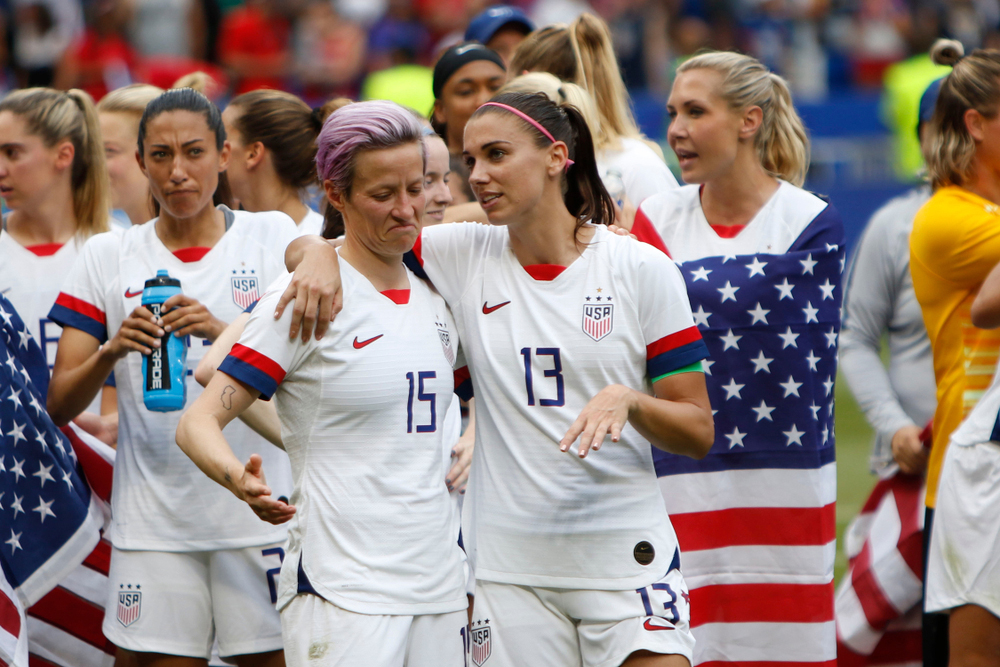In March 2019, members of the U.S. Women’s National Soccer Team (WNT) filed a collective and class action lawsuit in federal court against the United States Soccer Federation, Inc. (USSF), asserting claims under Title VII of the Civil Rights Act of 1964 and the Equal Pay Act (EPA).
On May 1, 2020, a U.S. district court judge in the Central District of California ruled in favor of the USSF on nearly all of its requests for summary judgment (dismissal without a trial), removing the bulk of the WNT’s claims and leaving few issues for the upcoming trial.
Background
The WNT’s lawsuit centered on the following claims:
- The USSF discriminated against the WNT in violation of the EPA and Title VII by paying them less than similarly situated players on the U.S. Men’s National Soccer Team (MNT).
- The USSF discriminated against the WNT in violation of Title VII by providing unequal working conditions between the WNT and MNT.
The WNT’s main contention—that the USSF paid WNT players less than MNT players—was summarily rejected by the court.
Judge Bases Ruling on Total Compensation Calculation
Under the EPA, employers must provide equal pay to employees, regardless of sex, “for equal work on jobs the performance of which requires equal skill, effort, and responsibility.” To be successful on its EPA claim, the WNT had to prove it was paid less than the MNT.
While the WNT argued the men’s team’s collective bargaining agreement (CBA) provided for higher bonuses than the WNT’s, the court found the women, as a whole, made more money than the men in the relevant time period due to guaranteed wages they had negotiated.
According to the court, “wages” paid to employees include all compensation received—base pay, bonuses, benefits, and more. By simply looking at the difference in bonus structures between the teams’ CBAs, the women’s team had focused on only a portion of the wages received. Because the WNT, on the whole, made more money in the relevant time period than the MNT, the court found members of the women’s team couldn’t prove they were paid less than members of the men’s team.
The court furthered this point by highlighting that the WNT, which could have negotiated a similar “pay-to-play” agreement as the one found in the MNT’s CBA, rejected that structure in contract negotiations to ensure guaranteed compensation for its members. Based on the facts, the court granted summary judgment in favor of the USSF on the WNT’s unequal pay claims.
Trial Scheduled on Unequal Working Conditions Claim
As for the remaining claim—Title VII discrimination based on unequal working conditions—the court denied the USSF’s request for summary judgment.
According to the court, questions remained regarding whether the USSF violated Title VII by providing unequal working conditions between the WNT and MNT. Specifically, the women claimed unequal travel conditions (including charter flights and hotel accommodations) and personnel and support services (such as medical and training support). The claim will continue to trial, which is currently set for mid-June.
Lessons for Employers
Although the USSF received a favorable ruling, the court’s decision provides a few important reminders for employers regarding EPA and Title VII claims:
- You must ensure all wages—including base salary, bonuses, benefits, and more—are equal between employees who perform “equal work.” Merely paying them the same base salary won’t protect you from an EPA claim if they can show their potential for bonuses (as an example) is less than an employee of the opposite sex and no legitimate reason for such difference exists.
- If an employee can show unequal working conditions between employees of the opposite sex, you could be subject to liability under Title VII. As employees begin to return to the workplace after the pandemic, evaluate your policies and procedures to ensure not only employee safety with respect to COVID-19 but also that the working conditions in place do not vary (without legitimate reason) based on an employee’s sex.
- Due to the publicity and media attention surrounding lawsuits that include unequal pay claims, a favorable legal ruling doesn’t equate to a favorable ruling in the court of public opinion. In the WNT case, the team’s supporters continue to rally behind it and against the USSF. You must be aware that in the current era, allegations of unequal pay or treatment based on sex will likely be met with unwanted social attention (which can have an economic impact on your business). Your consistent review of policies and procedures to ensure compliance with the EPA and Title VII can help you avoid costly lawsuits.
Alyssa Lankford is an attorney in the Oklahoma City office of McAfee & Taft. She may be reached at alyssa.lankford@mcafeetaft.com.

